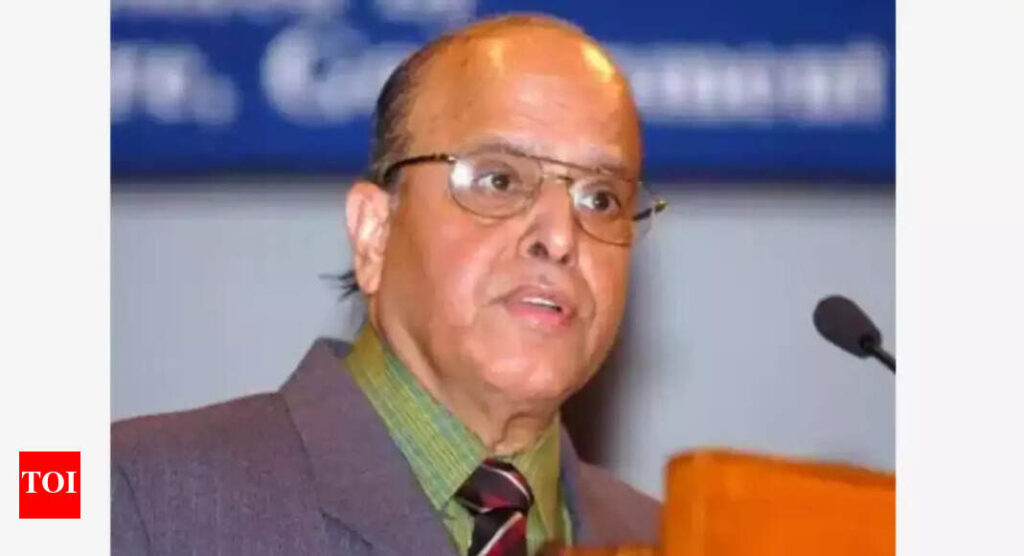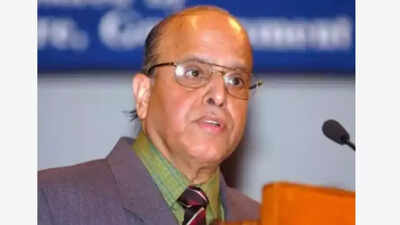BENGALURU: Former Isro chairman K Kasturirangan, 85, who had donned many hats in his long career as a scientist and administrator breathed his last at 10.43am at his residence in Bengaluru, on Friday (April 25, 2025).
He had been unwell for several months. As per Isro, his body will be kept in RRI for paying last respects on Sunday (April 27) from 10am to 12pm.
His health particularly suffered after a heart attack in Sri Lanka on July 10, 2023, when he was airlifted to Bengaluru’s Narayana Hrudayalaya hospital for treatment.
His contributions to the Indian space programme has been immense: He oversaw activities relating to India’s INSAT-2, a new generation communication satellite and two remote sensing satellites. Much prior to this, he was the project director of India’s first two experimental satellites, Bhaskara-I and II. He served as Isro chairman for nine long years before being replaced by Madhavan Nair in August 2003.
According to Isro: “Further, he has also overseen the design, development and launching of the world’s best civilian satellites, IRS-1C and 1D, realisation of the second generation and initiation of third generation INSAT satellites, besides launching ocean observation satellites IRS-P3/P4. These efforts have put India as a pre-eminent space-faring nation among the handful of six countries that have major space programmes.”
As an Astrophysicist, Kasturirangan’s interest included research in high energy X-ray and gamma ray astronomy as well as optical astronomy. Isro says he has made extensive and significant contributions to studies of Cosmic x-ray sources, celestial gamma-ray and effect of cosmic x-rays in the lower atmosphere.
Kasturirangan was a member of several important scientific academies, both within India and abroad. Born on October 24, 1940, at Ernakulam to C M Krishnaswamy Iyer and Visalakshi, Kasturirangan completed his Bachelor of Science with honours and Master of Science degrees in Physics from Bombay University and received his doctorate degree in Experimental High Energy Astronomy in 1971 working at the Physical Research Laboratory, Ahmedabad.
“Under his leadership as Chairman, Isro, the space programme witnessed several major milestones including the successful launching and operationalisation of the India’s prestigious launch vehicle, the Polar Satellite Launch Vehicle (PSLV) and more recently, the first successful flight testing of the all important Geosynchronous Satellite Launch Vehicle (GSLV),” according to Isro.
After superannuating from Isro, Kasturirangan became a Rajya Sabha member, served as chancellor of the Jawaharlal Nehru University, chairman of the Karnataka Knowledge Commission and director of National Institute of Advanced Studies. He was also a member of the now defunct Planning Commission of India.
More recently he was instrumental in formulating India’s new education policy, as chairman of the National Education Policy (NEP) committee. Among other things, the government had also commissioned a report from a team led by him on the Western Ghats, recommendations from where, however, not yet been implemented.
Domestically, he was a fellow of the Indian Academy of Sciences, Indian National Science Academy, National Academy of Sciences of India, Indian National Academy of Engineering, Astronautical Society of India, National Telematics Forum, The Indian Meteorological Society etc, while he was also a member of the International Astronomical Union and the International Academy of Astronautics and is a member of its Board of Trustees.
“He has chaired some of the prestigious international committees, such as, the International Committee on Earth Observation Satellites (CEOS), Panel for Space Research in Developing countries of COSPAR/ICSU, and the committee meeting at senior official level of UN-ESCAP, that led to the adoption of the “Delhi Declaration” by the Ministers of the region (1999-2000),” according to Isro.
Further, he was the chairman of the Governing Board of the UN Centre for Space Science & Technology Education (UN-CSSTE), among the Board of Governors of IIT Chennai, member of the Governing Council of the Raman Research Institute and Research Council of the National Aerospace Laboratory.
While he has won several awards, including the prestigious Shanti Swarup Bhatnagar award in Engineering, the government has recognised his contributions through Padma Vibhushan. He has published more than 240 papers in the areas of astronomy, space science and applications, and has edited six books.


